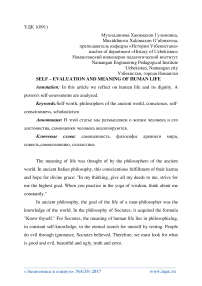Self - evaluation and meaning of human life
Автор: Muxiddinova X.G.
Журнал: Экономика и социум @ekonomika-socium
Статья в выпуске: 4 (35), 2017 года.
Бесплатный доступ
In this article we reflect on human life and its dignity. A person's self-assessments are analyzed.
Self-worth, philosophers of the ancient world, conscience, self-consciousness, scholasticism
Короткий адрес: https://sciup.org/140123345
IDR: 140123345
Текст научной статьи Self - evaluation and meaning of human life
The meaning of life was thought of by the philosophers of the ancient world. In ancient Indian philosophy, this conscientious fulfillment of their karma and hope for divine grace: "In my thinking, give all my deeds to me, strive for me the highest goal. When you practice in the yoga of wisdom, think about me constantly."
In ancient philosophy, the goal of the life of a man-philosopher was the knowledge of the world. In the philosophy of Socrates, it acquired the formula "Know thyself." For Socrates, the meaning of human life lies in philosophizing, in constant self-knowledge, in the eternal search for oneself by testing. People do evil through ignorance, Socrates believed. Therefore, we must look for what is good and evil, beautiful and ugly, truth and error.
In medieval European philosophy, much attention was also paid to selfknowledge and self-awareness. Christian Socratism, ascending to Augustine and based on the priority of self-observation before the position of the external world, was characterized in the early scholasticism by a serious study of the human problem. Here the concepts of the inner and outer man are worked out, the most valuable and necessary is the knowledge of the essence and ultimate destiny of the human soul. Conscience is considered as an arena for the struggle between good and evil. In mature scholasticism, too, great importance was attached to the problems of self-knowledge and self-awareness by examining the human soul in relation to the divine mind.
"So, avoid all variability; Bypass not only everything that is visible, but everything that is changeable. After all, you passed the flesh that is visible, passed the sky, the sun, the moon and the stars, which are visible; Bypass and everything that is changeable. After all, having finished with this, you have reached your spirit, but even there you have found the variability of your spirit. And is God changeable? So, bypass and your spirit. Pour out your soul, in order to reach God, about which you are told: "Where is your God?"
In medieval oriental religious philosophy, the meaning of life consists in striving for the supreme, to God, omnipresent Allah. "He is the one who created you all that is on earth, then turned to heaven and arranged it out of the seven heavens. He knows everything about every thing! "
At the same time, we meet with the understanding that a person should devote his life to the service of science. Thus, the great philosopherencyclopaedist Abu Ali Ibn-Sino wrote:
"Strive for the knowledge of the soul,
She will hold them, like the stars rise.
The soul is a lamp, whose fire is knowledge,
Allah's wisdom is the oil for him.
The lamp is gone,That your existence is over. "
The great Uzbek poet, philosopher Alisher Navoi saw the meaning of his life in serving the people:
"Of all I tried my best to do
Justice in the palace is blooming. "
With him echo the words of the great Russian poet Alexander Pushkin:
"And for a long time I will be so kind to the people,
That I kindly aroused the kind feelings ... "
Russian writer A.Chekhov saw the meaning of his life in the awakening of humanity in a man. He wrote: "I would order to hang a hammer to every person's door so that he remind people with his knocking, how much around people's grief, how many people who need help."
Very beautifully written about the meaning of life Uzbek poet Zulfiya: "I would give a thousand lives to all those who are sad, hurt, weak!Is it not for that and in the world I? Is not that the meaning of life ?! "The first president of Uzbekistan, I.A. Karimov "The meaning of life consists in faithful service to our Motherland, our people".
Used sources:
-
1. The Mahabharata. Bhagavad-gita 57
-
2. Anthology of world philosophy. In 4 vols. T.1. P.1
-
3. The Gospel of John. Psalm. 41, 4
-
4. The Koran. Surah 2. The Cow 27 (29). C.13
-
5. Ibn Sina. Selected. Kytaa 4. P.226. Pushkin A.S. Op. In 3 vols. T.1. I erected a monument to myself not made by hands. P. 586
-
6. Pushkin A.S. Op. In 3 vols. T.1. I erected a monument to myself not made by hands. P. 586
-
7. Farkhodzhonova NF Problems of applying innovative technologies in the educational process at the international level. - Non-governmental educational institution of higher professional education "Mordovian Humanities Institute"
(Saransk) conference: XVI Makarkin scientific readings. Innovative tendencies, socio-economic and legal problems of interaction in the international space Saransk, March 26, 2016. Organizers: Mordovian Humanitarian Institute.
«Экономика и социум» №4(35) 2017
Список литературы Self - evaluation and meaning of human life
- The Mahabharata. Bhagavad-gita 57
- Anthology of world philosophy. In 4 vols. T.1. P.1
- The Gospel of John. Psalm. 41, 4
- The Koran. Surah 2. The Cow 27 (29). C.13
- Ibn Sina. Selected. Kytaa 4. P.226. Pushkin A.S. Op. In 3 vols. T.1. I erected a monument to myself not made by hands. P. 586
- Pushkin A.S. Op. In 3 vols. T.1. I erected a monument to myself not made by hands. P. 586
- Farkhodzhonova NF Problems of applying innovative technologies in the educational process at the international level. -Non-governmental educational institution of higher professional education "Mordovian Humanities Institute" (Saransk) conference: XVI Makarkin scientific readings. Innovative tendencies, socio-economic and legal problems of interaction in the international space Saransk, March 26, 2016. Organizers: Mordovian Humanitarian Institute.


